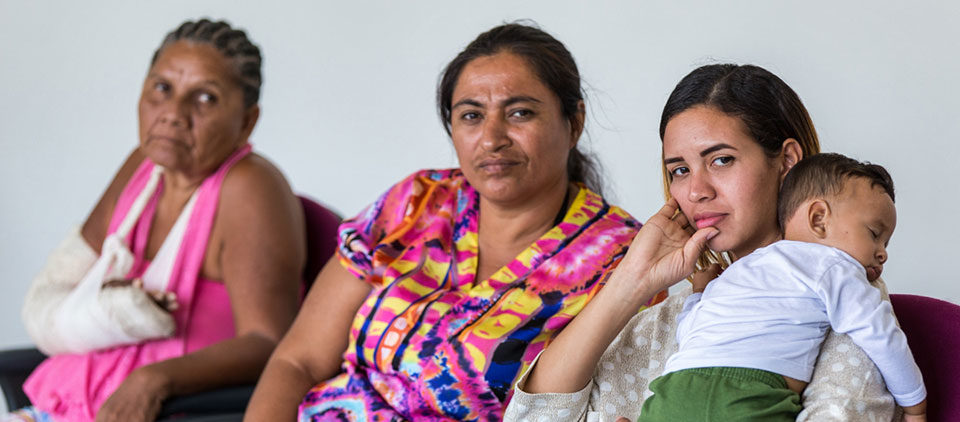WPHF will channel urgent and flexible funding to civil society organizations and women’s activists in Venezuela working to increase women’s meaningful participation in humanitarian planning and response and in peacebuilding and recovery efforts.
Our Work
In Venezuela, WPHF will support local women’s groups and civil society actors working to mainstream gender in humanitarian planning, programming, and service delivery.
WPHF also will also support civil society organizations working to ensure women and girls’ meaningful participation in peacebuilding and recovery planning and that their gender-specific needs are met in conflict and post-conflict settings.
Background
The economic contraction and the far-reaching effects of the coronavirus pandemic (COVID-19), exacerbated by unilateral sanctions, continue to affect the socio-economic and humanitarian situation in Venezuela, despite the good signs of economic recovery in 2022. Latest reports estimate that seven million people need humanitarian support, 56% of whom are women and girls. These populations, largely employed in the informal and hardest-hit sectors, were disproportionately impacted by COVID-19, having restricted abilities to absorb economic shocks and being exposed to increased gender-based violence. The 2021 Humanitarian Needs Overview released by the United Nations Office for the Coordination of Humanitarian Affairs (OCHA) shows that women and girls face higher protection risks, especially along mobility routes. Likewise, they are most affected by food insecurity and limited access to water, hygiene, sanitation, health services, menstrual health, and energy. Finally, they are often excluded from education due to gender roles and the care work burden.
Although women are the primary beneficiaries of governmental social protection programs in Venezuela, the COVID-19 crisis has greatly limited their access to socio-economic recovery plans and protection. Hence, it is essential to incorporate a transformative gender perspective and promote women’s and girls’ participation in the six priority thematic areas of OCHA’s Humanitarian Response Plan (HRP) in Venezuela: health; nutrition, food security, and livelihoods; human mobility; protection risks; provision of and access to essential services; and education.
Despite these challenges, women continue to lead peace, security, and humanitarian initiatives, across the country. Yet, their limited participation in civic spaces and decision making at all levels, including political processes, remains challenging. Even though women represent nearly 34% of Venezuela’s National Assembly, the socio-political context requires further integration of gender approaches, oriented towards women’s inclusion in social fabric reconstruction and a greater recognition of their critical role as agents of peace and actors in shaping lasting political consensus.
The results of the 2021 regional and municipal elections evidenced that women’s political participation at the subnational level continues to represent a challenge. The percentage of women elected as governors was just 9%, and 18% in mayoral offices. According to data from the European Union Electoral Observation Mission, this may be related to the fact that political parties applied parity only vertically and not horizontally.
The Dialogue and Negotiation process between the Government and the opposition’s Unitary Platform of Venezuela, suspended mid-October 2021, was an opportunity to advance women’s participation in peacebuilding and humanitarian action. The Memorandum of Understanding signed by both parties reflected their commitment to make “specific efforts to include women in the delegations” and their will to establish “consultation mechanisms with other social and political actors”. Thanks to the advocacy of civil society, women’s representation in both delegations was increased, considering international experiences showing women’s influence in promoting peacebuilding and peaceful coexistence. Other critical opportunities to strengthen women’s participation include conflict-prevention community initiatives, the processes of justice reform, the legislative agenda, and the designation of positions in the different branches of government ahead of the next electoral cycle (2024-2026).
There are both challenges and opportunities for reconfiguring a new political and social pact that is inclusive for women and their organizations in Venezuela. Women’s participation at the local level is crucial for strengthening community structures, leading to local, regional, and national decision-making sphere participation. Women’s leadership in public life is also critical for peaceful coexistence and reconfiguration in a context of humanitarian needs. Under the triple nexus approach, it will contribute to achieving the 2030 Agenda and the Sustainable Development Goals.
Our Vision
In Venezuela, WPHF will ensure the financing and coordination of local civil society organizations and activists working to enhance women’s meaningful participation in humanitarian action and leadership in peacebuilding and recovery efforts across the country.
